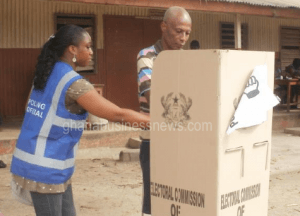EC, IPAC reject ‘no verification, no vote’
 The Electoral Commission (EC) has reached an agreement with the political parties through the platform of the Inter-Party Advisory Committee (IPAC) to introduce manual verification of voters alongside biometric verification for Elections 2016.
The Electoral Commission (EC) has reached an agreement with the political parties through the platform of the Inter-Party Advisory Committee (IPAC) to introduce manual verification of voters alongside biometric verification for Elections 2016.
EC and the political parties at an IPAC meeting accepted the manual verification for people whose particulars appear on the voters register but who may be rejected by the biometric verification devices.
The EC in a statement signed by Mr Christian Owusu-Parry, Acting Director, Public Affairs and copied to the Ghana News Agency in Accra said the parties also accepted a working definition for “over-voting” as; having occurred where the number of ballots in the ballot box exceeds the number of verified voters.
IPAC also agreed on 29,000 polling stations to be used for the 2016 general election instead of the 30,000 previously agreed due to budget constraints of the EC.
The EC discussed its calendar of activities for the 2016 general election, which was accepted by IPAC.
The EC informed IPAC that the panel, led by Justice V.C.R.A.C Crabbe that was engaged by the Commission to collate views on the voters register and to make recommendations to the Commission on the way forward, presented its report on December 21.
The Commission would study the report and make a decision on the voters register as soon as practicable.
It assured the nation that it would make the report of the Crabbe panel as well as the Commission’s final position available to the public shortly.
The issue of no verification, no vote became a subject of litigation during the landmark Supreme Court election petition filed by the Election 2012 Presidential Candidate of the opposition New Patriotic Party (NPP), Nana Addo Dankwa Akufo-Addo and two others.
The petitioners had submitted that about a million people voted without going through the process of biometric verification and had prayed the highest court of the land to cancel those votes.
But the Supreme Court in a majority decision of 5-4 dismissed the petition and recommended electoral reforms that would make elections free and fair.
As a sequel to the recommendation, the Electoral Reforms Committee was formed to help formulate a more credible election process that would ensure that the outcome of the polls is generally acceptable to all political parties.
The committee came out with proposals, some of which have been wholly accepted with some few modifications by the EC.
Others have been accepted in principle by the Commission but would require further discussion with IPAC.
Source: GNA
